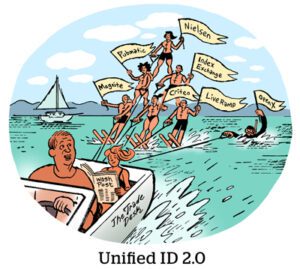Google isn’t bluffing about quitting its third-party cookie habit.
That’s because consumer concerns about data privacy and pressure from regulators around the globe have left Google with no choice but to discontinue third-party cookie usage in Chrome, said Dan Taylor, VP of global ads at Google, at AdExchanger’s Programmatic I/O conference in New York City on Monday.
“It’s really something that Chrome needs to do competitively,” Taylor said.
Tactical delays
Google’s latest delay to its cookie deprecation deadline was based on feedback from all sides of the advertising ecosystem, Taylor said. Basically, both the buy side and the sell side have told Google they’re not ready to move on from cookies just yet, according to Taylor.
The ecosystem’s preparedness may be a concern, but the strongest sticking point for Chrome is that regulators are not sold on the alternatives Google has proposed to third-party cookies, like its Privacy Sandbox initiative.
“Frankly, we made some commitments with the CMA in the UK, and we’re applying those commitments globally, that we’re not going to roll out a change to third-party cookies until we have some robust solutions in place for the ecosystem,” Taylor said. “This is an innovation problem that we haven’t solved yet.”
And that innovation problem might not be solved anytime soon. Google’s oversight commitment with the CMA gives Google until 2028 to satisfy the CMA’s concerns about the Privacy Sandbox and its cookie phaseout.
While Google and other ad companies have been feeling the effects of the EU’s GDPR data privacy law for the better part of five years now, they also feel increased regulatory pressure in the US. California has led the way with its CCPA and CPRA privacy laws, and Colorado, Connecticut, Utah and Virginia also have state privacy laws on the books.
“We really are worried about the pockmarking of state-level privacy regulations, not necessarily because of the concepts behind the regulation, but because it’s becoming incredibly difficult to manage slightly variant privacy regulations,” Taylor said. “Some of [these regulations] have had an unintended cooling effect on the programmatic ad industry overall.”
In lieu of a patchwork of state laws, Google would prefer and has advocated for a federal privacy law, Taylor said. But the company is also concerned that some in Congress want “an outright ban on personalized advertising, which can [include] anything from search queries to anything interest-based, even on the same site.”
First-party data moves
Rather than swim against the tides of consumer preference, as Google has in the past, Google is trying to be more conscious of making product decisions that improve consumer trust, Taylor said. While he admitted that sounds like a platitude, he pointed to the company’s advertiser transparency initiative as a sign of good faith.
And recent developments in the Privacy Sandbox, like the addition of support for publisher first-party cookies in Google Ad Manager and testing of the Topics and FLEDGE APIs, demonstrate Google’s commitment to being a player in the industry’s pivot to first-party data, Taylor said.
“We hung all of our hopes and dreams on third-party technology,” he said. “And that ended up being a privacy compromise for users.”
















